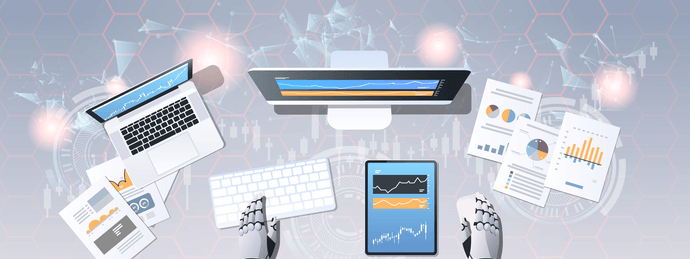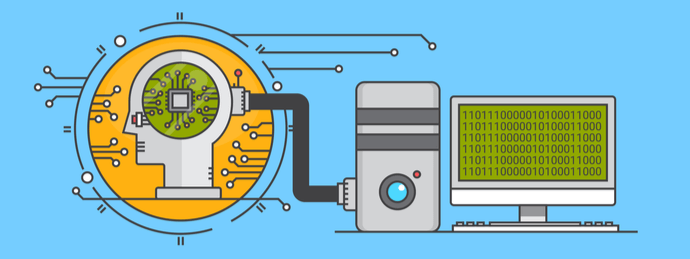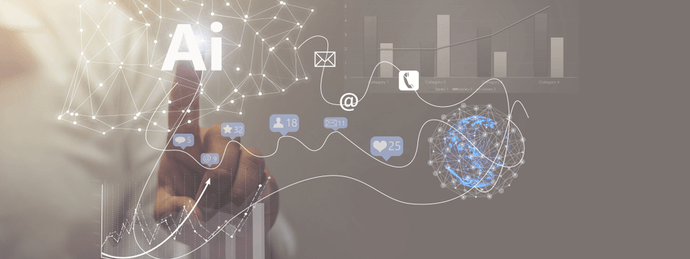Artificial intelligence is a technology that assists in accomplishing specific tasks based on a computer-based algorithm system. It proves to be at least a partial substitute for human intelligence in almost every field. Marketing is one of those fields which utilizes this type of technology. AI enhances the functionality within companies to meet their marketing goals. From demand forecasting to multichannel reach, AI can be used in multiple ways among marketers and demand generation specialists.
Here, we will discuss 15 benefits of the use of artificial intelligence in marketing.
1. Uncover new opportunities
According to the Narrative Survey, 61% of business executives are using AI in marketing. It reveals new opportunities and predicts the latest market trends with the help of an AI database system in 2016.
Data-driven insight through AI is a helping hand for marketers to innovate their services and products. Without any human assistance, AI executes various more beneficial tasks than those who do not apply artificial intelligence to their businesses.
2. Demand predictions
The report (Sizing the prize) of PwC shows that artificial intelligence or deep learning proves very fruitful for decision-makers to analyze customers’ behavior.
Sentiment analysis uses to explore customers’ likings for a specific product or a service. The foundation of it lies in machine learning which is an application of AI. It tells about the customer preferences and predicts the demands of the upcoming orders from different customers.
3. Meliorating revenue
According to the combined survey of EverString and Heinz, almost 50% of business-to-business (B2B) marketers use some form of AI in marketing. There is a significant role of AI in B2B marketing. B2B marketers believe that it boosts your revenue with its complex algorithm system.
4. Insightful 360 customer view
From marketing to pricing, every company’s activity impacts the increasing or decreasing sales of its company.
So, it is crucial to find the views of customers to get more leads or revenue. For this purpose, companies integrate Artificial Intelligence into their CRM that presents a single view after analyzing and concluding a heavy amount of data.
5. Discover maturity level among your customer bases
By exploring the data of each customer, you can find out the maturity level of any customer. Social networking sites, tools, and apps play an indispensable role to gain insights from customers.
AI in marketing collects data of campaigns, database, and social media reports and prepare a conclusion. Companies analyze this final data and drive sales.
(Also Read: What is AI Marketing?)
6. Convert leads into sales
A company requires not only leads but also sales to get revenue. Without sales, leads are useless for organizations. It is a fact that there is an enormous difference between leads and sales of any company. With the help of machine learning, companies find and target those leads which have more chances of converting into sales.
7. Never miss a sales opportunity
If you want to grow your business, it is super necessary to be proactive and never miss a single chance of sales opportunities.
The needs of customers, the right time to sell, and competitors’ analysis are three main factors to get more sales opportunities. You can increase sales and make better strategies for the future with the optimized data provided by the Artificial Intelligence system.
8. Avert loss of revenue
Revenue loss is a disastrous hurdle for any company. With AI, you can cope loss of revenue of your company.
You can analyze why customers are leaving your products or services and why they are going to other brands. You can purpose mindful strategies to provide excellent services to your customers with data-driven insights of Artificial Intelligence.
9. Automated lead scoring
Leads score are very crucial for a company. AI automates the process of lead scoring and accurately certifies more leads.
Marketers get their projects done without any strenuous efforts and involvement of humans. All lead scores qualify by machine learning.
10. Data segmentation
It is a process which concise heavy amount with AI. It is one of the proven benefits of AI in marketing. You cannot get these benefits if you use human intelligence.
AI provides deep insights or datasets. You can quickly achieve various marketing goals with the help of AI datasets.
11. Personalization
It is always important to know about your previous customers’ behavior to make them regular customers of your company.
AI draws data analysis based on customers’ sentiments and feedback against your product or service. You get not only lead generation but also the engagement of your customers for your marketing company.
12. Customer behavior
It is no doubt that you can use different sources to know the visibility of customers. Email, Mobile phones, websites, and social media platforms are gaining popularity to find new potential customers for your marketing company.
AI provides support to count the action of your customers too. With a deep learning approach, you can find out the interests of your customers.
13. Personalized user experience
AI is a handful of tools to personalize the experience of users. Many companies use artificial intelligence to get the personalization of users.
For example, Amazon suggests to their customers for purchasing various products by analyzing their previous data or browsing history. It is actually an example of the use of AI in marketing. It would be best to integrate AI into your system to suggest products or services to their customers.
14. Multidimensional reach
There are different sources like messenger, SMS, Facebook, and Email to reach your diverse customers. There is enormous data on these sources. So, it is hard to find valuable data of your potential clients.
AI assists in getting authentic information about your customers. It analyzes the data of each customer for marketers that is a bit difficult for a human.
15. Near perfect timing estimates
If you do not act on time, you cannot get valuable results. With Artificial technology, you can estimate when you should take action and when a response could be expected from your customers.
After judging all marketing plans and datasets, timing is another crucial element to get success for your marketing business.
Final Thoughts
No doubt, Artificial Intelligence draws a remarkable change in the marketing field. The sole purpose of this article is to give information about the benefits of AI in marketing. We hope you get a piece of valuable knowledge about AI after reading it.
To learn more about the benefits of AI in B2B marketing and how you can start seeing results, contact Byonic.AI today for a demo. Schedule a call today.










